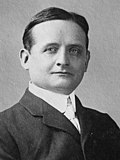| |||||||||||||||||||||
| |||||||||||||||||||||
| |||||||||||||||||||||
| Elections in Massachusetts |
|---|
 |
The Boston mayoral election of 1905 took place on Tuesday, December 12, 1905. [1] Democratic nominee John F. Fitzgerald defeated Republican nominee Louis A. Frothingham and four other contenders to win election to his first term as Mayor of Boston. Ahead of the general election, primary elections had been held on Thursday, November 16, 1905.
Contents
- Results
- Democratic primary
- Republican primary
- Other candidates
- General election
- See also
- References
- Further reading
Daniel A. Whelton, who had become acting mayor upon the death of Mayor Patrick Collins in September 1905, [2] did not run for the position.
Fitzgerald was inaugurated on Monday, January 1, 1906. [3]


